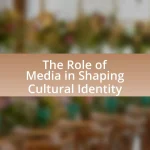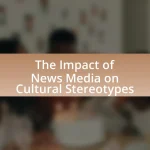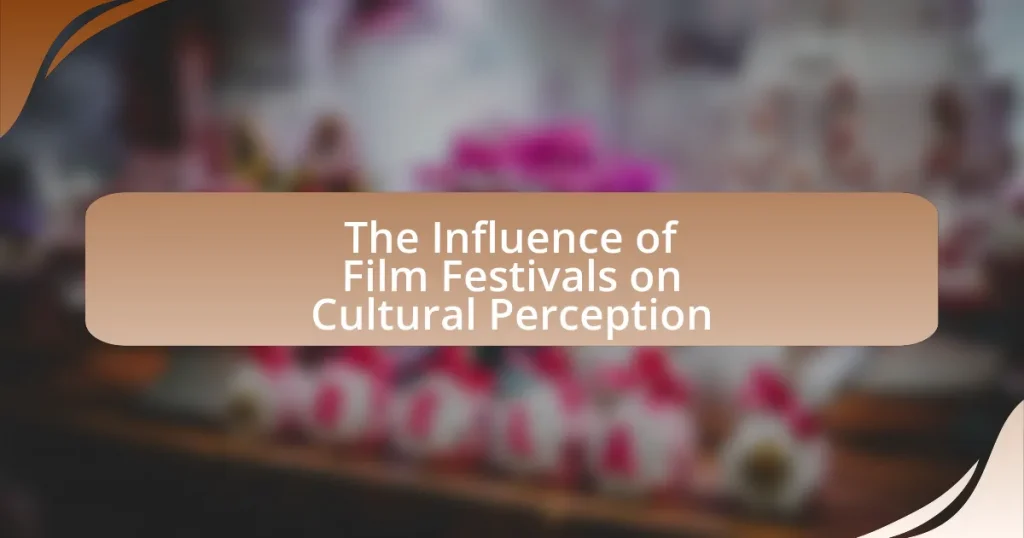Film festivals play a pivotal role in shaping cultural perception by showcasing diverse narratives and perspectives that often go unnoticed in mainstream media. They provide a platform for filmmakers from various backgrounds, fostering engagement with different cultures and social issues. The article explores how film festivals influence cultural narratives, the significance of film selections in representation, and the impact of audience reactions on cultural understanding. Additionally, it examines the role of awards in shaping cultural perception, the importance of geographic context, and the strategies festivals can implement to enhance diversity and inclusivity. Through these discussions, the article highlights the essential function of film festivals in promoting cross-cultural dialogue and understanding.
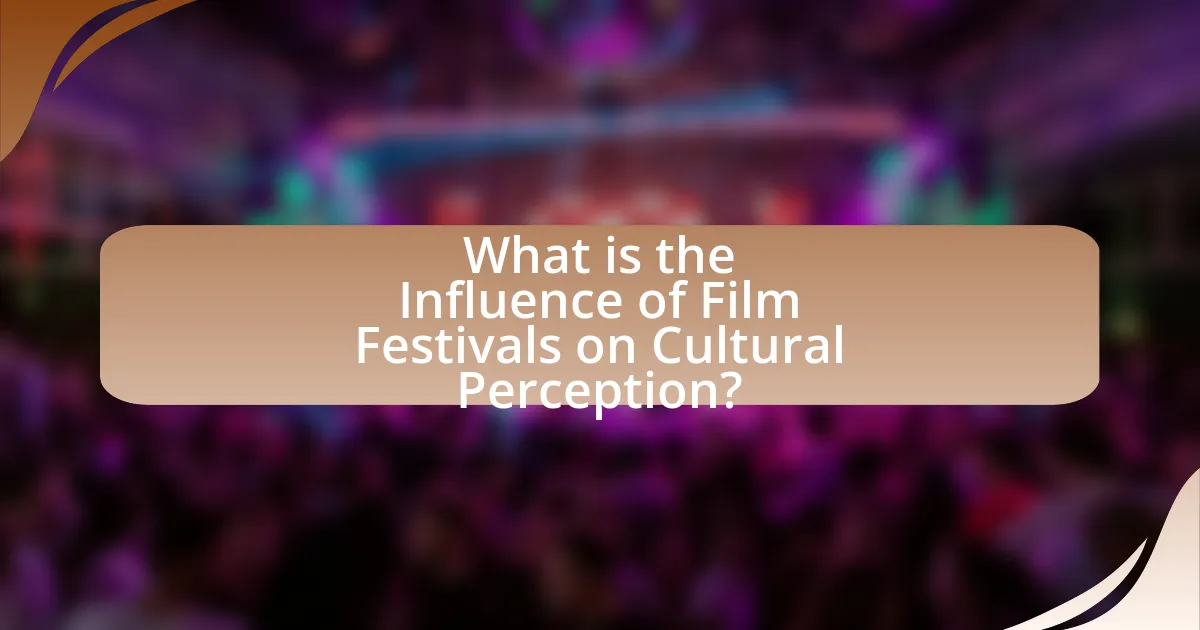
What is the Influence of Film Festivals on Cultural Perception?
Film festivals significantly shape cultural perception by showcasing diverse narratives and perspectives that may not receive mainstream attention. These events provide a platform for filmmakers from various backgrounds, allowing audiences to engage with different cultures, social issues, and artistic expressions. For instance, the Cannes Film Festival has historically highlighted international cinema, influencing global trends and perceptions about cultural storytelling. Additionally, studies indicate that exposure to films from different cultures can enhance empathy and understanding among viewers, as evidenced by research published in the Journal of Communication, which found that audiences exposed to foreign films exhibited increased cultural awareness and sensitivity. Thus, film festivals play a crucial role in broadening cultural horizons and fostering dialogue among diverse communities.
How do film festivals shape cultural narratives?
Film festivals shape cultural narratives by providing a platform for diverse voices and stories that reflect societal issues and cultural identities. These events curate films that often challenge mainstream perspectives, allowing underrepresented filmmakers to showcase their work, which in turn influences public discourse and cultural understanding. For instance, the Sundance Film Festival has been instrumental in promoting independent films that address topics like race, gender, and social justice, thereby shaping the cultural narrative around these issues. Additionally, festivals like Cannes and Toronto International Film Festival highlight global cinema, fostering cross-cultural dialogue and awareness. This exposure not only enriches the cultural landscape but also encourages audiences to engage with and reflect on different cultural narratives.
What role do film selections play in cultural representation?
Film selections play a crucial role in cultural representation by determining which narratives and perspectives are showcased to audiences. These selections influence public perception and understanding of diverse cultures, as films often serve as a medium for storytelling that reflects societal values, traditions, and issues. For instance, the inclusion of films from underrepresented communities at festivals can challenge stereotypes and promote cultural awareness, as seen in the rise of films like “Parasite,” which garnered global attention and highlighted class disparities in South Korea. This demonstrates that curated film selections can significantly shape cultural discourse and foster empathy among viewers, ultimately impacting how cultures are perceived on a global scale.
How do audience reactions influence cultural understanding?
Audience reactions significantly influence cultural understanding by shaping perceptions and interpretations of cultural narratives presented in films. When audiences engage with films at festivals, their emotional and intellectual responses can highlight cultural nuances, foster empathy, and challenge stereotypes. For instance, studies have shown that positive audience reactions can lead to increased interest in and acceptance of diverse cultures, as seen in the success of films like “Parasite,” which garnered global acclaim and sparked discussions about class and social issues in South Korea. This interaction between audience feedback and cultural representation underscores the role of film festivals as platforms for cross-cultural dialogue and understanding.
Why are film festivals significant in global cultural exchange?
Film festivals are significant in global cultural exchange because they serve as platforms for showcasing diverse cinematic works from various countries, fostering cross-cultural dialogue. By presenting films that reflect different cultural narratives, values, and artistic expressions, these festivals facilitate understanding and appreciation among international audiences. For instance, the Cannes Film Festival, established in 1946, has historically highlighted films from around the world, contributing to the global visibility of non-Western cinema. This exposure not only promotes cultural diversity but also encourages collaboration among filmmakers, thereby enriching the global film landscape.
What impact do international film festivals have on local cultures?
International film festivals significantly influence local cultures by promoting cultural exchange and enhancing visibility for local filmmakers. These festivals serve as platforms where diverse narratives and artistic expressions from various countries are showcased, fostering a greater understanding of different cultures. For instance, the Cannes Film Festival has historically introduced international films to local audiences, leading to increased interest in global cinema and cultural practices. Additionally, studies indicate that regions hosting such festivals often experience economic boosts and heightened tourism, which further integrates local culture with global cinematic trends. This interaction not only enriches the local cultural landscape but also encourages dialogue and collaboration among filmmakers, artists, and audiences.
How do film festivals promote cross-cultural dialogue?
Film festivals promote cross-cultural dialogue by showcasing diverse films from various cultures, which facilitates understanding and appreciation among different audiences. These events provide a platform for filmmakers to present their unique narratives, allowing attendees to engage with stories that reflect different cultural perspectives. For instance, the Cannes Film Festival features films from over 50 countries, highlighting global issues and cultural nuances that resonate with international audiences. This exposure fosters discussions and interactions among viewers, filmmakers, and critics, thereby enhancing cultural exchange and empathy.

What are the key factors that contribute to the influence of film festivals?
The key factors that contribute to the influence of film festivals include their ability to showcase diverse narratives, attract industry professionals, and foster cultural exchange. Film festivals serve as platforms for independent filmmakers to present unique stories that may not receive mainstream attention, thereby enriching cultural discourse. Additionally, the presence of industry professionals, such as producers, distributors, and critics, at these events can lead to networking opportunities and increased visibility for selected films, which can significantly impact their distribution and reception. Furthermore, film festivals often promote cultural exchange by bringing together international filmmakers and audiences, facilitating dialogue about different cultural perspectives and enhancing global understanding. These elements collectively enhance the festivals’ role in shaping cultural perception and trends within the film industry.
How does the location of a film festival affect its cultural impact?
The location of a film festival significantly affects its cultural impact by shaping the audience demographics, accessibility, and regional cultural narratives. For instance, festivals held in major cities like Cannes or Sundance attract international attention and diverse filmmakers, enhancing global cultural exchange. In contrast, festivals in smaller towns may focus on local stories and community engagement, fostering regional identity. Research indicates that festivals in urban areas often lead to increased tourism and economic benefits, which can further amplify their cultural significance. The 2020 Sundance Film Festival, for example, generated an estimated $70 million for the local economy, illustrating how location can enhance cultural visibility and influence.
What cultural elements are highlighted by the festival’s geographic context?
The festival’s geographic context highlights local traditions, regional identities, and cultural diversity. For instance, festivals often showcase indigenous art forms, culinary practices, and traditional music that reflect the unique heritage of the area. Additionally, the location influences the themes of the films presented, often addressing local social issues or celebrating historical events relevant to the community. This connection between the festival and its geographic setting fosters a deeper understanding of the culture, as evidenced by events like the Sundance Film Festival, which emphasizes stories from the American West and indigenous perspectives, thereby enriching cultural dialogue and awareness.
How does the local community engage with the festival?
The local community engages with the festival through active participation in various roles such as volunteering, attending screenings, and organizing events. Community members often volunteer to assist with logistics, which fosters a sense of ownership and pride in the festival. Additionally, local residents frequently attend film screenings and discussions, contributing to the dialogue around cultural themes presented in the films. This engagement not only enhances the festival experience but also strengthens community bonds and promotes local culture. For instance, studies have shown that festivals can increase local tourism and stimulate economic growth, demonstrating the tangible benefits of community involvement in such events.
What is the role of awards and recognition in shaping cultural perception?
Awards and recognition play a crucial role in shaping cultural perception by validating artistic expression and influencing public opinion. They serve as benchmarks for quality and creativity, often elevating the visibility of certain films and filmmakers within the cultural landscape. For instance, films that win prestigious awards, such as the Academy Awards or the Cannes Film Festival, often gain significant media attention and audience interest, which can lead to broader cultural discussions and shifts in societal values. Research indicates that award-winning films tend to receive higher box office revenues and critical acclaim, reinforcing their impact on cultural narratives and perceptions.
How do awards influence filmmakers’ cultural narratives?
Awards significantly influence filmmakers’ cultural narratives by validating their artistic choices and shaping public perception. When a film receives an award, it often gains increased visibility and credibility, which can lead to a broader audience engagement. For instance, films that win prestigious awards like the Academy Awards or Cannes Film Festival accolades often see a surge in box office revenue and critical acclaim, reinforcing the themes and messages they portray. This validation can encourage filmmakers to explore specific cultural narratives, as evidenced by the success of films addressing social issues, such as “Parasite,” which won the Best Picture Oscar in 2020, highlighting class disparity and cultural tensions in South Korea. Thus, awards not only recognize individual achievements but also steer the direction of cultural storytelling in cinema.
What is the significance of audience awards in cultural feedback?
Audience awards hold significant importance in cultural feedback as they reflect the collective preferences and values of the viewing public. These awards provide filmmakers and industry stakeholders with direct insights into audience reception, influencing future projects and marketing strategies. For instance, films that receive audience awards often experience increased visibility and box office success, as evidenced by the popularity of films like “The King’s Speech,” which won the Audience Award at the Toronto International Film Festival and subsequently gained critical acclaim and commercial success. Thus, audience awards serve as a vital barometer for cultural trends and public sentiment, shaping the landscape of film and media.
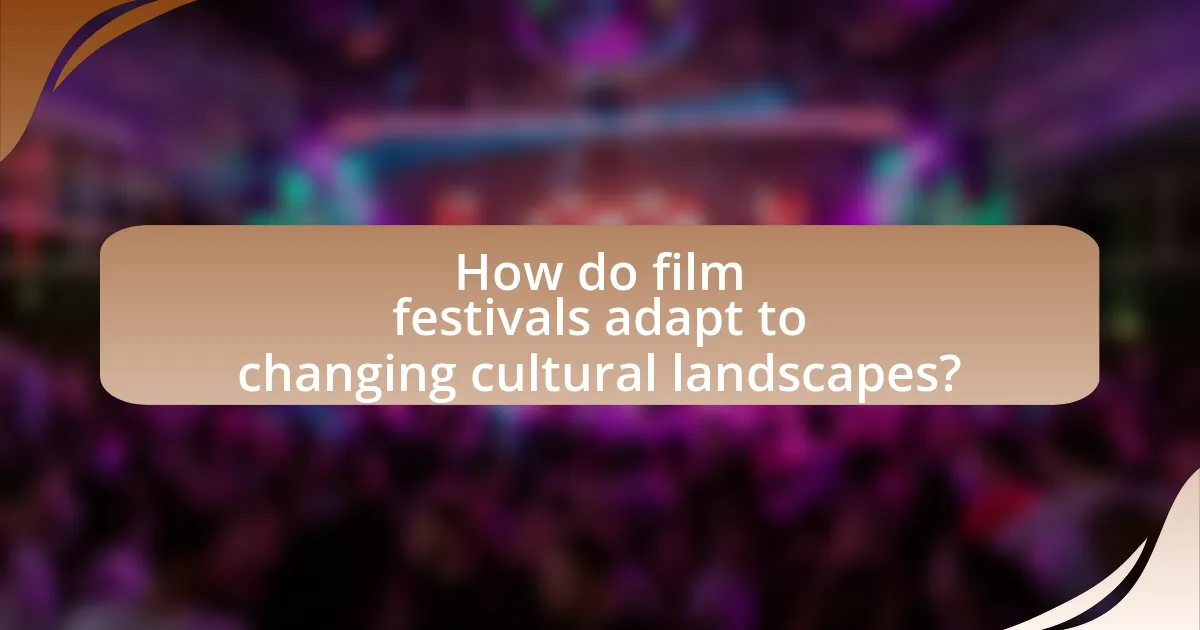
How do film festivals adapt to changing cultural landscapes?
Film festivals adapt to changing cultural landscapes by curating diverse programming that reflects contemporary social issues and global narratives. For instance, festivals like Sundance and Cannes have increasingly included films that address themes such as racial inequality, gender identity, and climate change, responding to the growing demand for representation and inclusivity in media. This shift is evidenced by the rise in films from underrepresented voices, with Sundance reporting that in 2021, 50% of its feature films were directed by women, showcasing a commitment to gender parity. Additionally, many festivals have embraced digital platforms to reach wider audiences, especially during the COVID-19 pandemic, allowing for virtual screenings and discussions that engage global viewers. This adaptability not only enhances audience engagement but also ensures that film festivals remain relevant in a rapidly evolving cultural context.
What trends are emerging in film festival programming?
Emerging trends in film festival programming include a focus on diversity and inclusion, with many festivals prioritizing films by underrepresented filmmakers. This shift is evidenced by initiatives like the Sundance Film Festival’s commitment to showcasing a minimum of 50% women directors in its lineup, reflecting a broader industry movement towards equitable representation. Additionally, there is an increasing emphasis on virtual and hybrid formats, which gained traction during the COVID-19 pandemic, allowing festivals to reach wider audiences and adapt to changing viewing habits. This trend is supported by data showing that online screenings can significantly increase attendance and engagement compared to traditional in-person events. Furthermore, environmental sustainability is becoming a key consideration, with festivals implementing green practices and promoting films that address climate change, as seen in the Cannes Film Festival’s initiatives to reduce its carbon footprint.
How do festivals respond to social and political movements?
Festivals respond to social and political movements by serving as platforms for expression, awareness, and advocacy. For instance, film festivals often showcase works that highlight social issues, such as the Sundance Film Festival, which has featured films addressing topics like racial inequality and climate change. This engagement not only reflects the current socio-political climate but also influences public discourse by bringing marginalized voices to the forefront. Additionally, festivals may incorporate panels, discussions, and workshops that focus on activism, thereby fostering community engagement and encouraging dialogue around pressing societal issues.
What innovations are being introduced to enhance cultural engagement?
Innovations being introduced to enhance cultural engagement include the use of virtual reality (VR) and augmented reality (AR) technologies in film festivals. These technologies allow audiences to immerse themselves in different cultural experiences, making films more interactive and engaging. For instance, the Venice Film Festival has incorporated VR experiences that transport viewers into the narrative world of the films, fostering a deeper connection with the cultural themes presented. Additionally, online platforms for film festivals have expanded access, enabling global audiences to participate and engage with diverse cultural narratives, as seen with the Sundance Film Festival’s digital offerings. These innovations not only enhance viewer engagement but also promote cross-cultural understanding and appreciation.
How can film festivals better represent diverse cultures?
Film festivals can better represent diverse cultures by actively curating films from underrepresented communities and ensuring diverse voices are included in the selection process. This approach not only highlights a variety of cultural narratives but also fosters inclusivity and understanding among audiences. For instance, the Toronto International Film Festival has implemented initiatives to showcase Indigenous filmmakers, which has led to increased visibility and appreciation of Indigenous stories in cinema. Additionally, festivals can collaborate with cultural organizations to host panels and discussions that deepen audience engagement with the films and the cultures they represent, further enhancing cultural representation.
What strategies can be implemented to include underrepresented voices?
To include underrepresented voices, film festivals can implement strategies such as establishing dedicated categories for diverse filmmakers, creating mentorship programs, and actively engaging with community organizations. Establishing dedicated categories allows for the recognition and celebration of films from marginalized groups, which can increase visibility and representation. Mentorship programs can connect emerging filmmakers from underrepresented backgrounds with industry professionals, fostering talent development and networking opportunities. Engaging with community organizations ensures that the festival programming reflects the interests and stories of diverse populations, thereby enhancing cultural relevance and inclusivity. These strategies have been shown to improve representation in film, as evidenced by initiatives like the Sundance Institute’s commitment to supporting diverse voices, which has led to a significant increase in films by underrepresented creators showcased at their festival.
How can festivals ensure equitable access for diverse filmmakers?
Festivals can ensure equitable access for diverse filmmakers by implementing targeted outreach programs, providing financial support, and creating inclusive selection processes. Targeted outreach programs can connect with underrepresented communities, ensuring that filmmakers from diverse backgrounds are aware of submission opportunities. Financial support, such as grants or waived entry fees, can alleviate barriers that may prevent diverse filmmakers from participating. Additionally, inclusive selection processes that prioritize diversity in juries and programming can help to ensure that a wider range of voices is represented. Research indicates that festivals that adopt these practices see increased participation from diverse filmmakers, enhancing the cultural richness of the festival and contributing to broader cultural perception.
What practical steps can filmmakers take to leverage film festivals for cultural impact?
Filmmakers can leverage film festivals for cultural impact by strategically selecting festivals that align with their film’s themes and target audience. By participating in festivals that focus on specific cultural issues, filmmakers can engage with audiences who are passionate about those topics, thereby amplifying the film’s message. For instance, the Sundance Film Festival is known for showcasing independent films that address social justice, allowing filmmakers to connect with activists and organizations that can further promote their work. Additionally, filmmakers should actively participate in Q&A sessions and panel discussions to foster dialogue around their films, which can enhance cultural discourse and encourage community engagement. Research indicates that films presented at festivals often gain increased visibility and critical acclaim, which can lead to broader distribution and impact.


